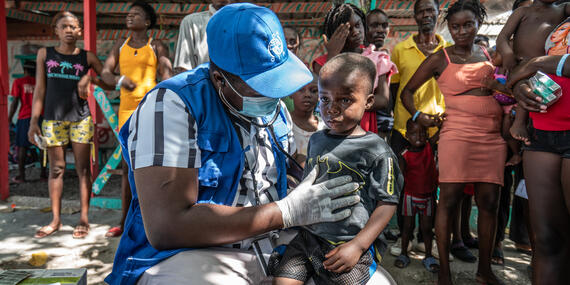Today's top news: Occupied Palestinian Territory, Haiti

Occupied Palestinian Territory
The availability of water for drinking and domestic use in Gaza is shrinking each day.
Humanitarian partners say the municipal wells are currently at just a tenth of their production capacity prior to the escalation of hostilities – it’s now just over 21,000 cubic metres a day, down from 255,000 cubic metres a day. Water from these wells is known to be substandard, given it is brackish (salty).
Water from the Israeli-operated lines had been the best source of safe drinking water prior to the hostilities. But at present, only one of the three Israeli lines – the Bani Said point – is functional, yielding less than half of what would have been available if all lines were working.
Furthermore, water availability through the short-term desalination plants is currently at just seven per cent of the pre-crisis capacity. Due to import restrictions on critical items, water testing kits and chlorine to treat the water across Gaza are unavailable.
The accumulation of solid and fecal waste, which has been worsened by rains and floods, is also giving rise to severe health and environmental threats.
The World Health Organization (WHO) is already reporting 152,000 cases of diarrhoea – more than half among children under the age of five – and the inability to do water chlorination to kill bacteria is aggravating the already concerning situation.
WHO says that on average, 500 people are sharing one toilet, and some shelters have none. More than 2,000 people are having to share a single shower.
Lack of toilets and sanitation services have forced people to resort to open air defecation, increasing concerns over disease outbreaks.
Disrupted routine vaccination activities, as well as lack of medicines for treating communicable diseases, is further raising the risk of diseases spread.
Many people who lack access to health facilities may be going undiagnosed, indicating that the situation could be more severe than it appears.
Routine surveillance systems are not currently functioning, hampering effective detection, analysis, and response to public health threats.
WHO, the UN Relief and Works Agency for Palestine Refugees in the Near East (UNRWA) and the Ministry of Health are scaling up a flexible disease surveillance system in many shelters and health facilities.
Meanwhile, our humanitarian colleagues are reporting that Israeli restrictions on the import of critical equipment -- including communications devices -- are severely compromising safe and effective aid operations anywhere in Gaza.
In the north, we and our partners are trying to increase humanitarian deliveries -- but access denials by the Israeli military are preventing a scale-up. Just seven of 29 planned missions during the first two weeks of January could be fully or partially carried out.
Moreover, all but one of 19 missions planned to deliver medicines and fuel to health facilities and water reservoirs and wells in northern Gaza were denied during the first half of January.
More details are available online in a new OCHA snapshot on humanitarian access north of Wadi Gaza.
Haiti
The 2024 Humanitarian Response Plan for the country has just been released online. It seeks US$674 million to help 3.6 million people across the country.
OCHA warns that the humanitarian situation in Haiti continues to deteriorate, forcing civilians into impossible choices for their survival. Even leaving the house exposes Haitians to a range of threats, including sexual and gender-based violence.
Escalating violence in Cap-Haïtien, Gonaïves, Ouanaminthe, Les Cayes and in areas of the capital Port-au-Prince continues to disrupt daily activities and hamper humanitarian operations.
In recent days, several businesses remained closed and transportation was not functioning. Some schools remain closed, affecting more than 130,000 students, who are missing out on the school feeding program, sometimes the only meal children receive for the day.
The ongoing violence also hinders humanitarian work. In Mariani, in the south of Port-au-Prince, gang violence has rendered access to southern Haiti nearly impossible.
The humanitarian community calls on all parties to put an immediate stop to the violence, allow safe access in all parts of the country and respect human rights and humanitarian principles.
